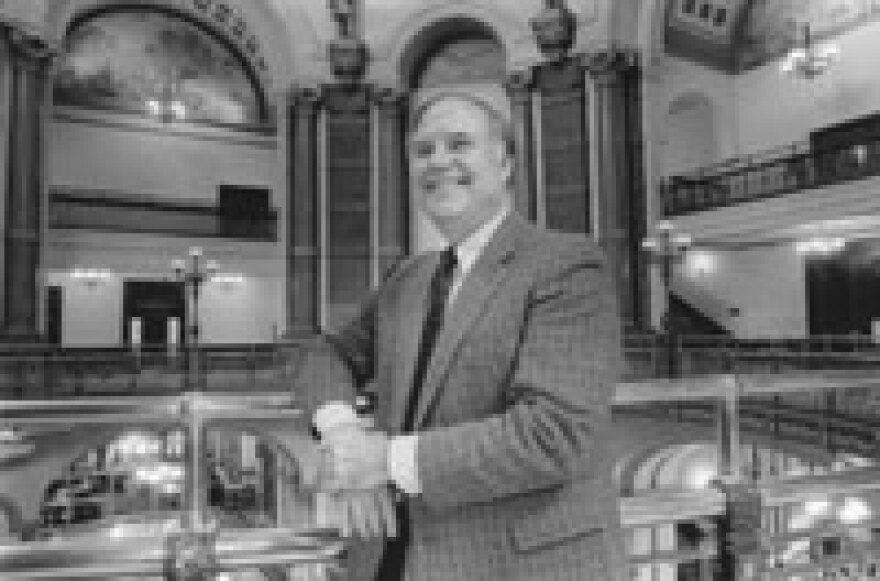Harry Potter and the Order of the Phoenix it’s not, but the late January release of The Master List created as great a stir in Illinois political circles as news that J.K. Rowlings’ fifth book about the boy wizard is coming in June.
The Master List, of course, is the 555-page scorecard Scott Fawell kept of the favors he dispensed as George Ryan’s chief of staff during the former governor’s two terms as secretary of state. So keen was interest in the document — made public at Fawell’s trial on charges of political corruption — that federal prosecutors had to enlist printing companies in Chicago and Springfield to meet the demand, at $13.50 a copy.
The list includes some 10,000 names, among them a Who’s Who of politicians and public officials, plus assorted business and labor leaders, sports figures — even some reporters — whom Fawell dutifully recorded as beneficiaries of the secretary of state’s largesse, ranging from jobs and contracts to low digit license plates.
The list, prosecutors said, reflected Fawell’s view of the secretary of state’s office as a campaign tool for Ryan’s political ambitions and of state workers and resources as means to that end. Some of those on the list readily admitted going to bat for a friend, relative or political supporter, while others said they didn’t ask for anything and don’t know why their names appeared.
Apparently, Fawell kept tabs on virtually every contact made with the secretary of state’s office as a potential quo for which a quid — a legislative vote, a campaign contribution, a favorably nuanced story — might be gained later. After all, that’s how the game’s been played in Illinois forever, right? Indeed, disclosure of The Master List merely confirmed what many Illinoisans assumed has been the case all along — clout counts in the back-scratching, log-rolling milieu in which government and politics are intertwined in Illinois.
But should citizens be content to continue with business as usual? As the Fawell trial and the licenses-for-bribes probe preceding it illustrate, the status quo carries a heavy price tag. Innocent lives were lost, for example, when unqualified applicants got commercial driver’s licenses in return for bribes, some finding their way into Ryan’s campaign coffers. Taxpayers were cheated by secretary of state workers laboring on state time to elect Ryan, using state equipment for campaign operations.
Harder to measure but no less real is the corrosive effect political corruption has on the public, spawning cynicism and undermining civic engagement — intangible harm more pernicious to society than mere dollars-and-cents losses.
The latest revelations, though, may be the catalyst required to engender change. Gov. Rod Blagojevich made ethics reform a key campaign pledge, and as the Fawell trial unfolded, the governor issued a series of executive orders designed to change what he called “a culture of corruption” permeating state government. The measures would:
• Create an independent inspector general to investigate any allegations of corruption in executive branch agencies. An ethics hotline also would be set up for citizens to report suspicious behavior.
• Provide greater protection from retaliation for state workers who report wrongdoing.
• Require ethics training for all state employees in an effort to “change the culture and establish a new mindset,” the governor said.
A hotline, whistle-blower protection and ethics training are among the recommendations of the Illinois Ethics Reform Project, a coalition of “good government” groups pushing for tougher standards in public life. “Anything we can do to help our state employees be sensitive to these issues is a good thing,” says Cindi Canary, director of the Illinois Campaign for Political Reform, a coalition member.
Other coalition proposals would:
• Prohibit government employees and appointees from seeking campaign contributions from those they supervise, regulate or license.
• Require state employees moonlighting as campaign workers to keep time sheets and travel logs — available for public inspection — that show how their working hours are divided, and to reimburse the state for the pro-rated cost of vacation, health insurance, pension credits and other fringe benefits for time spent on campaign duty.
• Ban state employees from going to work for a private firm with whom the employee negotiated contracts, worked with procurement, or supervised, regulated, investigated or licensed.
• Mandate more frequent and informative campaign finance disclosure reports and more detailed statements of economic interest.
Most of the coalition’s recommendations have bipartisan support in both chambers, reflecting what Canary hopes is a new appreciation among lawmakers for the degree to which average citizens are concerned about ethics in government.
“I am optimistic,” she says. “I think there’s an awareness of how far things have deteriorated. ... I think most legislators felt the fallout in their campaigns — they were asked questions they were not used to.”
But more than legislation will be required to change Illinois’ old way of doing business, Canary believes. “What we need is leadership that says this kind of behavior won’t be tolerated.”
Blagojevich seems determined to meet that challenge — and it’s one campaign promise that carries no price tag.
Charles N. Wheeler III is director of the Public Affairs Reporting program at the University of Illinois at Springfield.
Illinois Issues, March 2003






